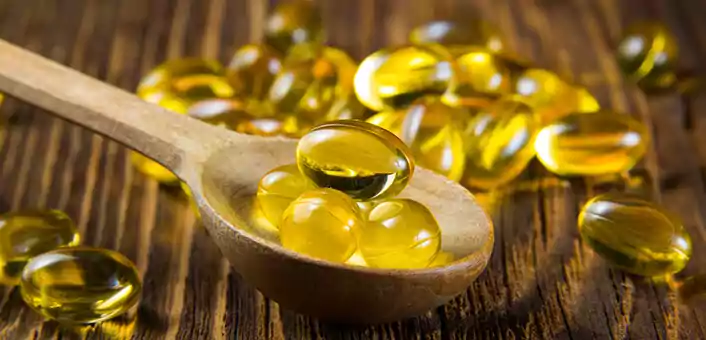
Polycystic Ovarian Syndrome
Omega 3 For PCOS: 13 Ways It Can Help You
Sep 18, 2017You’ve likely heard about the many health benefits of Omega 3 fatty acids. But one of its major benefits is for women who suffer from PCOS. Let’s dive deeper into the world of PCOS and how Omega 3 saves the day.
13 Benefits Of Omega 3 For PCOS
Women with PCOS (polycystic ovarian syndrome) have a number of symptoms that can be partially improved by Omega 3 fatty acids.
Weight Management – Cortisol is a stress hormone that contributes to the increase in fat, especially around the middle of your body. Women suffering from PCOS have elevated cortisol levels. Consumption of these fatty acids helps in reducing levels of cortisol that helps in weight management. Omega 3 foods also promote fat burning in the body and decrease hunger, which helps you in losing or maintaining weight easily.
Testosterone – Women who suffer from PCOS have high testosterone levels. This causes excessive facial hair growth, skin problems and even hair loss. Intake of these fats improves free testosterone levels in women with PCOS and helps with these issues.
Depression And Mood Disorders – An adequate level of EPA and DHA fatty acids are necessary for optimal brain function. Depressed people tend to have lower levels of Omega 3 fats. Omega 3 in fish oil helps to relieve depression.
Heart Disease – Women with polycystic ovarian syndrome, PCOS, have a significantly increased risk of developing heart disease compared to other women. Omega 3 fatty acids lower the risk of cardiovascular disease. A healthy diet and daily exercise are also important for a healthy heart for women suffering from PCOS.
Liver Disease – Consumption of Omega 3 fatty acid supplements has a beneficial effect on liver fat content, triglycerides and blood pressure.
Inflammation – Omega 3 fatty acids are anti-inflammatory in nature and therefore help in reducing inflammation.
Melatonin Hormone – The lesser known Melatonin is one of the most important hormones in the human body. It performs countless functions, including supporting ovarian health and egg quality. Women who suffer from PCOS suffer from disturbed sleep, which in turn harms the production of the melatonin hormone. Omega 3 fats favorably affect the pineal gland in the brain, which is the production center for melatonin. This, in turn, helps women who suffer from PCOS.
Fertility – One of the major issues faced by women suffering from PCOS is fertility. Intake of Omega 3 can lead to an improvement in the quality of eggs produced from the ovaries, in turn improving fertility.
Diabetes – Women with PCOS have a higher chance of getting diabetes. Consumption of foods that are rich in Omega 3 fatty acids decreases insulin resistance, the key reason behind diabetes. These fatty acids also lower triglyceride levels in people with Type 2 diabetes, which could lower their risk of heart disease.
Pregnancy – Women who suffer from PCOS and consume Omega 3 regularly are less likely to go into premature labor. Omega 3 deficiency also increases the mother’s risk for depression, which is another effect of PCOS.
Menstrual Problems – During PCOS, many women face severe menstrual pain that occurs in the lower abdomen, pelvis, and often radiates to the lower back and thighs. Consumption of Omega 3 has resulted in milder menstrual pain and improvement in postmenopausal hot flushes.
Cancer – Consumption of Omega 3 has been linked to a reduced risk of colon cancer and breast cancer in women suffering from PCOS.
Skin Problems – A number of women who suffer from PCOS have severe acne or skin breakouts. Omega 3 helps to keep skin cells healthy, preventing premature aging and also helps protect the skin from sun damage.
Foods Rich In Omega 3
There are two primary food groups through which you can consume these fats. The first one is plant-based sources and the second one is from fish, seafood, and algae. Both vegetarians and not vegetarians have ample sources through which they can have these fatty acids.
Plant Based Sources of Omega 3
- Flaxseeds – These seeds are by far the richest whole food source of the Omega 3. Flaxseeds oil is often used as an Omega 3 supplement.
- Chia Seeds – Chia seeds are incredibly nutritious. They are rich in manganese, calcium, phosphorus and of course, Omega 3.
- Walnuts – Walnuts are very nutritious and loaded with fiber. They also contain high amounts of copper, manganese, vitamin E and important plant compounds along with Omega 3. It is advisable to not remove their skin, as it contains most of the phenol antioxidants found in walnuts.
- Soybeans – Soybeans are a good source of fiber and vegetable protein. They also contain high amounts of other nutrients, including riboflavin, folate, vitamin K, magnesium and potassium.
- Spinach – Consumption of this Omega 3 rich leafy green is very important. It is a powerful appetite suppressant and rich in Vitamin E too.
- Canola Oil – It is touted to be the healthiest salad and cooking oil. Due to its low saturated fat content, it is said to be beneficial as a source of Omega 3.
- Tofu – It’s a terrific source of plant-based protein and its Omega 3 count is great!
Seafood-Based Sources of Omega 3
- Mackerel – Mackerels are small, fatty fish, which are rich in Omega 3. They can be smoked and eaten as whole fillets.
- Salmon – Salmon is one of the most nutrient-dense foods on the planet. It contains large amounts of magnesium, potassium, B-vitamins and Omega 3.
- Cod Liver Oil or Cod Liver Oil Supplements – Not only is this oil high in Omega 3 fatty acids, it is also loaded with vitamin D and vitamin A.
- Oysters – Oysters are not only delicious but are power packed with Omega 3 fats, zinc and B12.
- Anchovies – This super fish is rich in Omega 3 fats, calcium and potassium (both essential weight-loss minerals) as well as vitamin A.
- Caviar – Caviar is basically fish eggs or roe so not everyone can eat them because of its taste. However, it’s an excellent source of Omega 3.
Want To Explore More? Checkout Sepalika Polycystic Ovary Disorder (PCOD) Program
References:
https://www.ovarian-cysts-pcos.com/pcos-omega-fish-oil.html
https://www.ncbi.nlm.nih.gov/pmc/articles/PMC2621042/
https://www.ncbi.nlm.nih.gov/pmc/articles/PMC3770499/
https://www.ncbi.nlm.nih.gov/pubmed/17493949/
https://www.ncbi.nlm.nih.gov/pubmed/2710648 /
https://www.sciencedirect.com/science/article/pii/S0738081X1000044
https://www.healthline.com/nutrition/12-omega-3-rich-foods#section14
https://nutritiondata.self.com/facts/nut-and-seed-products/3163/2
https://nutritiondata.self.com/facts/nut-and-seed-products/3061/2
https://nutritiondata.self.com/facts/nut-and-seed-products/3138/2
https://nutritiondata.self.com/facts/legumes-and-legume-products/4378/2
https://www.eatthis.com/omega-3-foods
https://nutritiondata.self.com/facts/finfish-and-shellfish-products/7740/2
https://nutritiondata.self.com/facts/finfish-and-shellfish-products/4259/2
https://nutritiondata.self.com/facts/fats-and-oils/628/2
https://nutritiondata.self.com/facts/finfish-and-shellfish-products/4189/2
https://nutritiondata.self.com/facts/finfish-and-shellfish-products/4038/2





